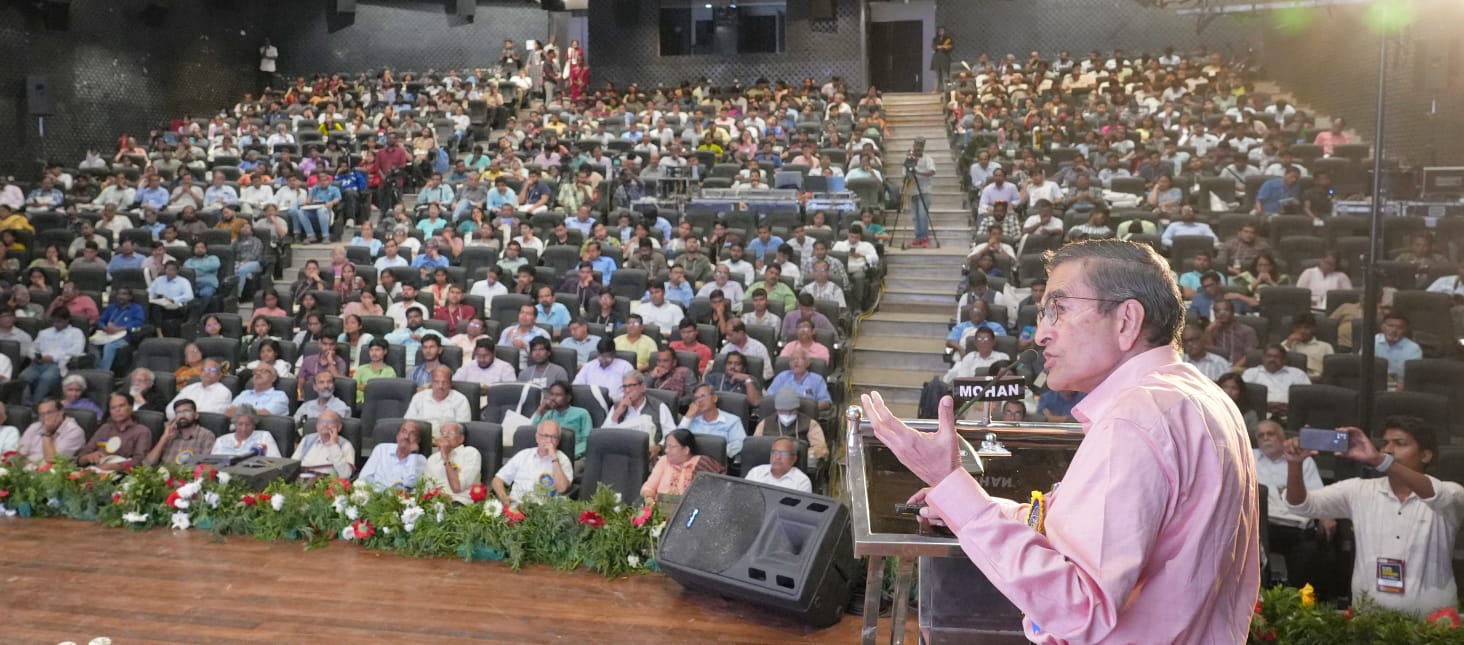The All India Science Conference organised by Breakthrough Science Society on Feb 8,9 and 10, 2025 at Tagore Theatre, Thiruvananthapuram, Kerala
A brief report of the conference is given below.
Prof Kurien Issac, Chairman of the Reception committee welcomed the speakers and the delegates.
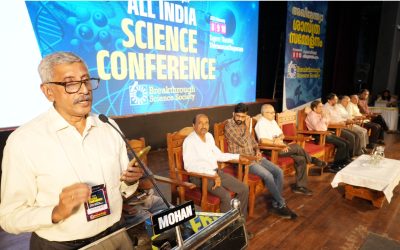
The conference was inaugurated by Prof. P. Balaram, former director of the Indian Institute of Science, Bangalore, and Padma Bhushan awardee. The inaugural session was held at the Tagore Theatre in Thiruvananthapuram and was presided over by Prof. Dhruba Jyoti Mukherjee, All India President of Breakthrough Science Society.
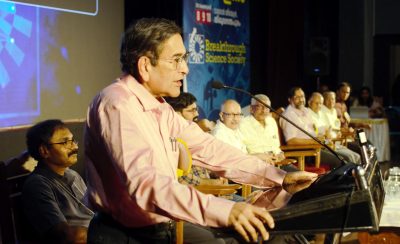
Dr. Soumitro Banerjee, All India General Secretary of Breakthrough Science Society, Dr. Kurian Isaac, former professor of IIT Mumbai, Prof. Dipankar Banerjee, Director, Indian Institute of Space Science and Technology (IIST), Thiruvananthapuram, Prof. C.P. Aravindakshan, President, BSS Kerala Chapter, Shri. Arul Gerald Prakash, former director of the Priyadarsini Planetarium, Thiruvananthapuram, Prof. Achuth Shankar, Dr. P.P. Rajeevan and Dr. Vaisakhan Thampi were present on the stage.
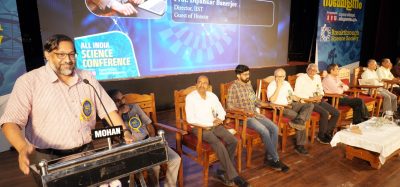
Prof. P Balram opined that Basic research should not be drowned in the flood to drive science to translate to immediate application. Scientific institutions should take measures in this direction. Diminishing research in fundamental disciplines, would have far reaching consequences. The roots of the glittering developments in information technology and biotechnology are possible due to research in basic sciences. Will new technology develop in circumstances not conducive to the growth of science? he asked.
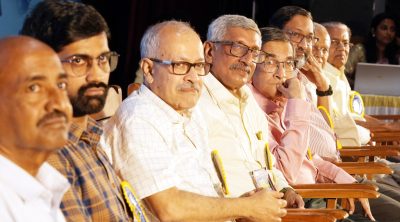
Science and technology are the two sides of the same coin. Scientists in academic fields are forced to take up responsibilities not conducive to the development of their fields. Even after spending a huge amount of money in the post 1950 period, the rate of new innovations is decreasing. This is because the research is directed towards private projects not in tune with the existing scientific knowledge, he added.
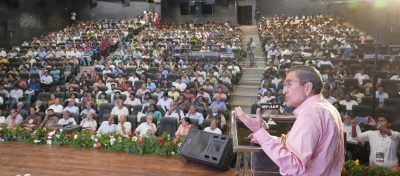
The first seminar following the inaugural session was “Environmental degradation and Climate change: Adaptation and mitigation”. The speakers were Dr C P Rajendran, professor, National Institute of Advanced studies, Bengaluru and Prof Dhrubajyoti Mukhopadhyay, President, Breakthrough Science Society. The session was chaired by Prof S Mahadevan, former professor, IISc, Bengaluru. Dr C P Rajendran highlighted the environmental damage being caused by the mindless developmental activities being carried out. Our water resources are getting depleted and getting polluted in a big way. He sited the example of river Ganga the lifeline of India. Out of 2525 km of the Ganges, only for a stretch of 80 km, the river flows freely. He also talked about the disastrous construction activities going on in the Himalayan region that has led to several calamities like landslides in the recent past. Prof Dhruba Mukhopahyay mainly discussed about the climate change. He warned about the increasing average global temperature that is leading to severe changes in the weather patterns in different parts of the world. He said that it has been clearly established that the major culprit is the rise of greenhouse gases. He stressed that if we do not take urgent measures to halt it, we will be heading for a global disaster. He also discussed about the mitigation measures to combat the climate disaster.
The second seminar that was held in the afternoon was on “Artificial Intelligence and its impact on science, education and social life”. Speakers Professor B. Raveendran, Department of Data Science and AI, IIT Madras, and Prof. Soumitro Banerjee, Former Director, IISER Calcutta were the speakers. Prof. R Manivarnan, former Head of the Department of Politics and Public Administration, University of Madras, chaired the session. The speakers opined that the scientific community should come forward to utilize artificial intelligence, the latest and most complex technology that modern science has gifted to humanity and which has unprecedented impact on all aspects of society’s life, for the overall well-being and good of society.
The third session was on “Wars and destructive Use of Science and Technology”. The speaker was
Dr. Natalia Dinat, a medical doctor from South Africa, an Organizing committee member of the International Union of Scientists and a Steering Committee member of Science for the People – South Africa Chapter. The session was chaired Dr Manabendra Nath Bera. The use of science and technology is widespread not only in the field of war but also in all kinds of destructive activities. We can see this in food production, energy production and even in justifying social evils including racism. She said that this can be stopped only if all the people involved in scientific research take a stand for ethics and the anti-war movement strengthens at the local, national and international levels. Dr. Natalia, who is also of Indian origin, also found time to speak on various topics to the delegates attending the conference, the children who came to see the exhibition and the general public.
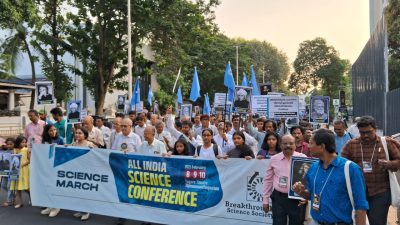
The next was a Science rally with the message of ‘Science for the good of society’ that started from the Tagore Theatre at 5 pm and marched to Manaviyam Veethi, a public park where a brief meeting was held. Students, teachers, scientists and science activists who arrived in connection with the All India Science Conference participated in the rally. The meeting was presided over by the chairman of the reception committee, Prof. Kurian Issac. The All India President Dhruba Jyoti Mukhopadhyay, General Secretary Prof. Soumitro Banerjee, science activist Dr. Natalia Dinat, who arrived from South Africa, Breakthrough Science Society State President Prof. C.P. Aravindakshan and Secretary Prof. P.N. Thankachan addressed the gathering.
The day 2 began with program to felicitate eminent scientists who have contributed to taking science to the people. The eminent scientists who were felicitated were Prof J V Narlikar, Mr Arvind Gupta and Ms Alexandra Elbakyan.
Condolence resolution was read out …..
The next session was on “NEP and Curricular changes in Science education”. The speakers were Prof S G Dani, former professor, TIFR and former President, National Board for Higher Mathematics and Prof Tarun K Naskar, former professor, Jadavpur University and Secretary, All India save Education Committee.
In the next session three Resolutions were placed and discussed.
(i) Resolution against the propagation of unscientific ultra-nationalist ideas in the name of Indian Knowledge System as part of NEP-2020
The resolution was read by Ms.Adrika and supported by Dr R Gangadhar
(ii) Resolution on centralisation of science administration and funding.
The resolution was read by Dr Siddhartha Bharadwaj and supported by Dr Apurba Senapati
(iii) Aberration of scientific culture; degradation of scientific ethics
The resolution was read by Mr Raju Acharya and supported by Mr Thabrez Khan
In the post lunch session three resolutions were placed and discussed.
(iv) Resolution demanding Anti Superstition Act across the country.
The resolution was read by Dr Shajahan and supported by Ms Dipti
(v) Resolution demanding urgent action on environmental protection and tackling climate change.
The resolution was read by Ms Pooja Sharma and supported by Dr R Venkatesan
(vi) Resolution against war and destructive use of Science and Technology.
The resolution was read by Dr Kanai Barik and supported by Mr V P Nandakumar
After a tea break the next session was a discussion on Science Learning Centres.
The most attractive event of the day was a cultural program in the evening. A music team led by Mrs Gayathri Swaminathan presented to the delegates a taste of south Indian classical music.
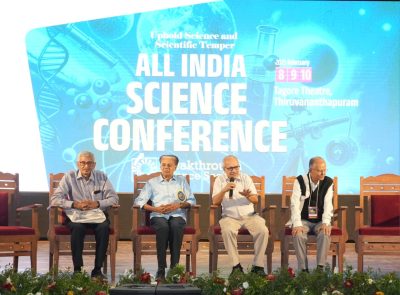
The final day on Feb 10 was mostly devoted to organisational discussions. The General Secretary’s report was placed by Prof Soumitro Banerjee and a discussion followed. Then Constitution amendments placed and discussed. The final amendments were adopted by the house. The conference came to a close with a discussion on the history of BSS by the veteran member Mr Debasis Roy.



